It is my privilege to give you a report on the recent Rendille safari, Wednesday 2nd. to Thursday 10th. March. I went with Deacon Joseph Ochola, which was his first visit. Again the Lord favoured us with health, a car that took us up and back with only a few starting problems. More important we were able to encourage our brethren, and we ourselves felt encouraged.
-
KORR
Wednesday 2nd. March
We had done half the journey on Tuesday and not being pushed for time we were able to make some stops on the way up. At the little town of Archer’s Post we crossed the Uaso Nyiro River, one of only 2 permanent rivers in the whole northern half of Kenya. It has been so dry that even this river was barely more than a trickle. Here we had refreshment with Pastor Vincent who works with one of our new PTC students, John Malala. He is not native to the place and it was so encouraging to hear his testimony of how the Lord led him to this very spiritually needy place. I pray he will read and understand Abraham Booth on Grace. 60 km. further north we stopped for refreshment at Sereolipi and met with Jacob who has also been reading our literature. This time I gave him Venning on The Seriousness of Sin. May the Lord mightily use this literature. Leaving the tarmac road behind at Merille we proceeded on the dirt road through Laisamis, then left on the road to Korr, stopping at Ndigir to encourage our brother Raphael Bulkash. We were brought up to date concerning the involvement of Government officials in the problem and their support of our work in all that has happened. We eventually arrived in Korr just before 6 pm having travelled about 50 km along the very dusty track. There had been a good shower of rain a couple of weeks earlier so ‘green’ was poking up through the bare earth. It was time to unload the car as I carry beds and bedding, extra fuel, food and water, in order to make ourselves self-sufficient. I cooked supper for myself and Joseph and then it was time to catch up on everything with Patrick Ochieng, our leader in Korr.
Thursday 3rd. March
We had devotions together from a chapter of 2 Corinthians each morning, and I cooked tea which we drank with cereal biscuits and peanut butter. It is hot so we need to have as much liquid intake as possible. We do not expect to eat lunch so must make sure we have protein. Many of the brethren come to greet us and we rejoice to see one another again. They are so happy to see Ochola again, as most of the church members in Korr used to be in Nairobi. We pass by one of the small shops to buy tea leaves and sugar to give as gifts when we go visiting.
-
Our first visit is to Dubsahaay Chaule, about 25 km west of Korr, one of the most remote of the circular villages (= goob) that we visit. It cannot be seen from the dirt road, and it may have moved from the time we last visited, and there are no signs to direct us! Someone calls out my name, remembering us from previous visits. One of our brethren with us in the car meets a relative. Eventually Patrick preached on John 3:16 to 17 women plus children in the dry, sandy river bed (or lugga). The men are all away with the animals. He needs an interpreter into Samburu/Rendille, just like I do. It is such an encouraging time, and because no one else ever comes here to preach, I tell Patrick that he is able to walk here so that there are more regular visits. One errand the men must fulfil for their wives when we go more than 10 km outside of Korr is to pick up firewood. Within 10 km it is forbidden because of the environmental degradation.
-
Coming back towards Korr we stop at goob Nahgaan where we sit down in the small hut of Ali Leeba and his wife gives us black tea. There is no milk as the animals are far away. We are sitting on cow skins on the dirt floor. We have a fairly typical conversation with Ali’s brother who says he believes in the message we bring. But we must ask if it has made any difference in his life, especially has he left the ‘vain traditions inherited from his fathers’? Almost no one has done this. But there is one lady in this goob, a widow named Timo who was recently baptized, and we again had tea in her hut, and she told us of the opposition she experiences because she will not follow the Rendille ceremonies but has put all her trust in Christ. It is very sad that the few other churches there are simply tell people to trust Christ without forsaking all else. Surely this is not what Christ and His apostles preached!
-
On reaching Korr after dark (throughout the year night starts around 7 pm) Godana’s family has kindly prepared a delicious meal, including chapatis (unsweetened pancakes). We fellowship with Jackson, as we eat outside under the heavens, as it is too hot inside the huts. I have not met him before. He has primary school education, knows Swahili far better than English, and acts as Patrick’s translator into Rendille. His parents-in-law had refused their daughter to continue to live with him when he was converted and turned away from the traditions, but they have now changed their mind and he is looking forward to being reunited very soon. He is building a house but has no resources to cover the stick framework with the gunny bags they buy in town.
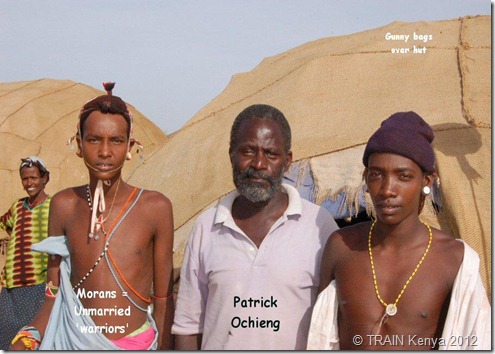
Jackson earnestly desires to preach the gospel to his people and we trust he is the beginning of the answer to our prayers for labourers. But I exhorted him to seriously study the Word.
Friday 4th. March
Much of the morning is taken up talking with Patrick about development of the church plot. With a gift we have received we want to put in a foundation for a permanent church building. We have been given a sizeable plot of 2-3 acres and we have to decide where to locate the building and which direction it should face, bearing in mind that the prevailing winds which are sometimes very gusty are always from the east, and the strong sunshine. Should it have a metal frame, or should we use reinforced concrete? Our well, which is the water supply, needs to be re-dug, and there needs to be a lockable top to stop dust and even animals from falling in. There are also many needs to consider: it is a time of serious drought and some cash is needed to push some forward; a traditional teenage girl has decided she wants education with much opposition from her parents and she needs school uniform; Wato is a church member and has heard that her father died some months ago way north near the Ethiopian border (Dukana) and needs money to go home to visit her mother (she belongs to the Gabbra people).
-
Today we are visiting Nahgaan Ngutsa. It is named after the leading man in the village. Once more, there is no road, we just make our way around the small hill and park near the lugga where men lie much of the day under the shade of a tree. We had given a lift yesterday to Ngutsa and he had invited us to come and preach. We are told no one has come to the village to preach before. I preach to 7 men on John 3:16 emphasizing that our greatest need is sin, not development. Other brethren preach under a nearby tree to women and children.
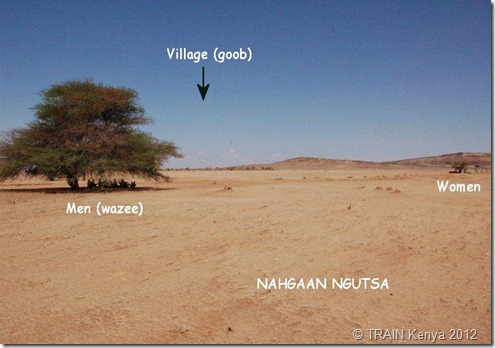
Jackson found it difficult to understand my English, and was surprisingly helped by one of the men listening. Musa had been a Muslim and knows English well! This is not what one would expect seeing him lying in the lugga with his traditional stool, dressed in a T-shirt and loin cloth, so interested in getting back to the game of ‘bola’ they are always playing.
-
We move along a few kms. to Mataarbah, to the hut of Sagante & Wareiya. We find where they are in the circle of huts that makes up the village. 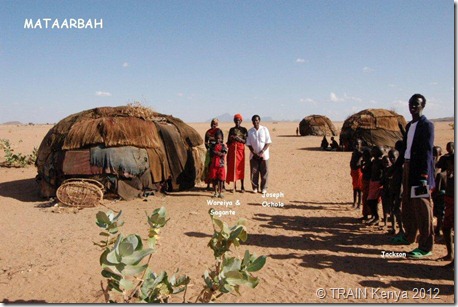 We supply milk, sugar and tea leaves, and we are refreshed! It is hot inside the small hut, we sweat, but it’s worth it! They were church members in Nairobi, but now they are living in a goob where there is no Christian influence. Sagante became too much one of the wazees (= older men), then took a second wife, and practices all the traditions. I had to rebuke him for walking in the ways of his people instead of in the ways of Christ. He replied that he had repented before God, and I sought to make sure he had done so before Wareiya. I also exhorted him to confess before his fellow wazees that he has done wrong by so closely joining with them. This was encouraging, and trust it was a spiritual turning point for them. They are living about 10 km. from our meeting place in Korr and very rarely come on Sundays.
We supply milk, sugar and tea leaves, and we are refreshed! It is hot inside the small hut, we sweat, but it’s worth it! They were church members in Nairobi, but now they are living in a goob where there is no Christian influence. Sagante became too much one of the wazees (= older men), then took a second wife, and practices all the traditions. I had to rebuke him for walking in the ways of his people instead of in the ways of Christ. He replied that he had repented before God, and I sought to make sure he had done so before Wareiya. I also exhorted him to confess before his fellow wazees that he has done wrong by so closely joining with them. This was encouraging, and trust it was a spiritual turning point for them. They are living about 10 km. from our meeting place in Korr and very rarely come on Sundays.
-
Finally we move on the tracks to the goob of Urowween. We first look at the tree under which the Nursery School of Moos gathers. Dominic is the teacher, and Patrick had the opportunity to challenge him to put his trust in Christ. As we sat outside the hut in the afternoon shade I talked with Ali, disabled through polio, who said he believes, but it is only a head faith. Both of these are able to read English and we gave them Venning, Sin is Serious, and Smeaton & Owen, Living with the living God. At the same time Joseph is telling others about the God who has revealed Himself in creation against whom we have rebelled. It was an encouraging time of personal ministry and reveals the openness of people to listen. But without the convicting work of the Spirit they will remain in their darkness.
-
After cooking supper we walked for more than half an hour in the darkness to Dubsahaay Dogo. Here is Chirodo, one of the newly baptized . We first went to the ‘nabo’, an open space enclosed by thornbush in which a log is kept burning and where the wazee meet each evening for discussion and traditional prayer. It is a sort of holy place where only married men are allowed to be. There are 7 tonight and I tell them that Jesus, not animal sacrifices, is the only way to God. We then enjoy tea outside Chirodo’s hut together with his wife. His mother is also there who is very sick with cancer.
Saturday 5th. March
This is the day we leave Korr, and it always a very difficult time as many people come to tell of their needs and we must seek to listen to each one. There are medical needs, and for many it is just sheer poverty. There are jealousies and accusations. Brother Joseph was of great help in dealing with many of them. To round it all off I have to talk with Patrick and the 2 Evangelists (Godana and Nadesol) so that they learn how to deal Biblically with any problems that come up between them. We finally get away just as it is getting dark.
-
LEKUCHULA
-
It is less than 30 km. drive to the big goob of Lekuchula which is populated by the Ariaal Rendille who speak Samburu rather than Rendille. Although it is past 8 pm and pitch dark we are welcomed especially by the children. I experience it nowhere else in Kenya, and they cling to my hands and legs. After tea it is time to ‘make the beds’ right there on the ground using the car to give some protection against the wind.
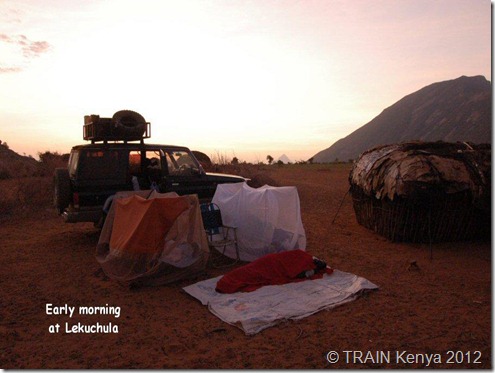
Sunday 6th. March
We meet under the rather dilapidated shade. Children sing and Patrick Ochieng teaches them through translation. Around 10 am we are ready for the service with 7 men and 10 women plus the many children (see photo below). They do not usually have a service here but now there is a young man (James) who has recently completed secondary school who we hope we can make use of. I have been coming here regularly for more than 10 years and we continue to have 2 faithful ladies, Ntito and Ndoroba. After the service it is difficult to talk as I need an interpreter. But I managed to talk with one mzee, Limongoi, with whom I have talked much about the gospel in the past. In typical Rendille style he could actually tell me that he is a Christian following God’s ways, yet I know him as a typically traditional man. May the Lord truly work in his heart and completely change his life, though a totally illiterate man.
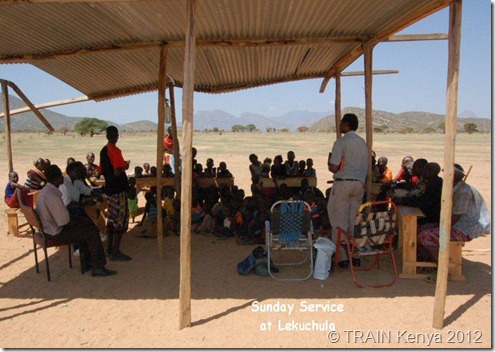
We chat and rest during the heat of the afternoon. We are surprised to hear the noise of a car as we do not usually come across another car for days on end. It is Michael of World Vision coming to check up on a child they sponsor. Lethore Lasantan has been with us for the day, one who was a church member in Nairobi, but when he came back to Korr in 2006 he ‘disappeared’. He said he has been looking for me, heard that I was to come, and has stayed a few days waiting. He lives in a goob the other side of the mountain which is in total spiritual darkness. We agree to visit with him tomorrow morning. Later in the afternoon we walk to the goob of Limongoi and preach to 6 wazee and 8 women on the Holiness of God.
Monday 7th. March
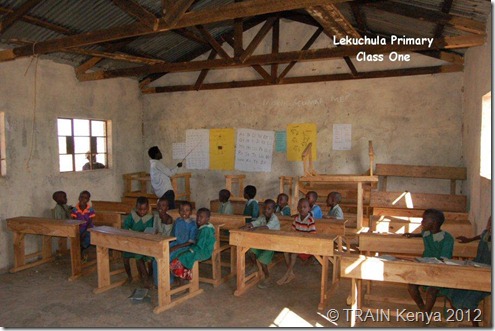
Before leaving Lekuchula we visit the nursery and primary school. The 2 nursery classes are under the tree and the corrugated iron shade. There is a permanent classroom for the class 1 of the newly started primary school (see picture above). These schools are sponsored by Trinity Baptist Church.
(9) We drive around the mountain (Bayo at over 5,700 ft.) and stop at a watering place. There is an outcrop of rock with a pit dug into it at the bottom into which rain water collects. It is of course filthy but a reliable source of water, a most scarce and valuable resource. We proceed to goob Lethore along an almost invisible track. We ask Lethore why he chose to live here where there is no Christian influence at all. Well, it is a goob of his 10 brothers and their families, so this is where he brought himself when he got married to a totally illiterate and traditional lady. He presented his need for me to buy him a few animals as he has nothing. At least they could provide some milk and his wife is expecting their first child. We are able to gather 10 wazee and 15 women, almost all of the goob. We need a translator so we wait for Ambrose to come from watering the cattle as he has secondary education. He is the son of the leading mzee in the goob. I am able to give him Venning’s Sin is Serious and he promised to visit Patrick in Korr. Again we believe the Lord has opened another door for us.
-
NDIGIR
(10) It is an exciting drive along the dry river bed of the river Malgis for at least 20 km. I thought we might see some wildlife, but only elephant droppings. Mid-afternoon we arrive at Ndigir and spend time talking with Raphael Bulkash.
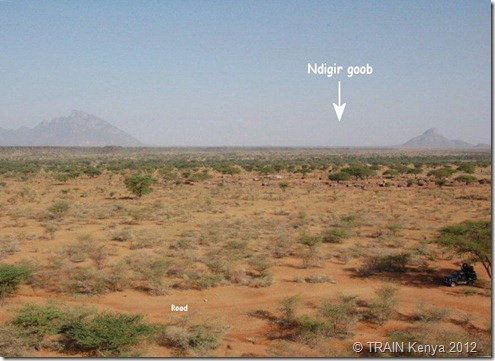
There are 4 big goobs that make up Ndigir and towards evening we walk to one of them where we are able to gather 5 wazee and 15 women and the 3 of us each have something to tell them from the Scriptures. We are accompanied by the leading mzee of the 4 goobs and on the way back he tells me that he trusts he will never refuse the Word of God like the wazees in Sokoteey from where Raphael had to recently flee. Then he revealed the real reason, because he does not know anything about the Bible, because there is no development in Ndigir. This always the dilemma we face. We want to bring the gospel, but there are obvious needs, no secure water supply, no school. We cannot ignore the latter, yet it can so easily obscure the former. Late in the evening at 9.30 we go to the ‘nabo’ of the goob outside of which we have parked the car and put our camp beds. 9 are seated or lying on the ground and I seek to tell them the wonderful news of Christ who was raised from the dead that shows how special He is and that we must therefore follow Him.
Tuesday 8th. March
We first enjoy singing by the nursery children, and listen in a bit to Franco teaching them.
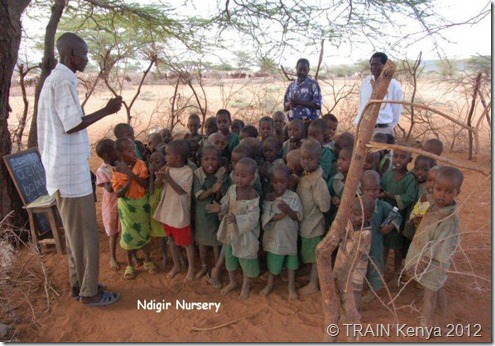
Then we go into the huts where there is a Class 1 & 2. We have decided to start a Primary School here as Raphael has his son and some orphan children he is caring for through Kindfund. The next nearest school is in Lontolio about 12 km. away. When a Government official recently visited he saw elephant droppings on the road between Ndigir and Lontolio and was horrified at the thought that young children might face such an animal on the way to school. So the Government is fully behind us. Then more than 20 of the wazees called us under the tree to tell us openly that they are glad Raphael Bulkash has come to Ndigir from Sokoteey and they have welcomed him with open arms. They went on and on and not one word was said about the preaching, but only about the need for development. It was my time to respond and as diplomatically as possible I told them that reason number one for our presence is to bring them the gospel of Jesus Christ. We might disappoint them by not being able to bring the development they want; they might not even like the message.
(11) I wanted to visit my friend Leparkerei in Sokoteey from where Raphael had been chased. He freely narrated his version of events and I tried to encourage by saying that talking together is the only way to bring understanding and reconciliation. This is so obvious yet not always done. Sometimes I feel the world is better at this than Christians are.
(12) We then drove the 12 km to Losidan where the church sponsoring another primary and nursery school. Raphael has come to preach here from time to time, but I have encouraged him to come on Fridays, as it is the privilege of the sponsor to have a time with all pupils and to be able to tell them of the Lord Jesus, and then to gather adults in the goob. We were able to speak to 3 wazee and 10 women, but they did not listen at all well. There are 2 Government paid teachers at the primary school. Zecharia is one of them having been posted from another part of Kenya. He does not speak the local language, and almost no one speaks English or even Swahili. Because of his background I sought to tell him that salvation is not by works but by faith in Chris and encouraged him to read Galatians. I also gave him the Smeaton & Owen book. On arrival back at Ndigir and after cooking supper we walked to another of the Ndigir goobs and Patrick preached on Matthew 11:28 to just 2 wazees and 7 women.
Wednesday 9th. March
The last day and Brother Ochola could not believe how fast the time had gone. He thought he might often have been at a loose end when in reality we hardly had time to think!
(13) This morning we planned to visit Laisamis the town on the main road where the District HQ are located. We were able to have audience with the chief Government Officer in the District (the DC) and his deputy (the DO1). They confirmed that the problems Raphael had experienced in Sokoteey were ‘politics’ and that they were fully behind us as a church in our work. I assured them that as Christians we respect the Government God has given us. We then visited the District Education offices to talk about our schools, as we now have 6 nursery schools and 3 primary schools in the District.
(14) On the way back to Ndigir we passed through Lontolio to visit with Stephen Leseitalo in order to reconcile him with Raphael. They both narrated their problems and forgave one another. We have urged Stephen to consider preaching in Lontolio where there is a centre with a primary school and then to resume the PTC in Nairobi. The Head Teacher in Losidan was also present to tell me of the urgent needs of the school that the church, as the sponsor, should take care of: repair of latrines that had been damaged in a heavy rain storm, and text books for the pupils that the Government may take a few years to provide. In Ndigir we had to talk with Raphael about needs for schools and his motorbike, and the opportunity he has to take the gospel to yet other communities. In the evening Ken Dobbins of Kindfund arrived to see how the digging of the well is getting on, and how Raphael and family are settling in.
Map showing 14 places visited
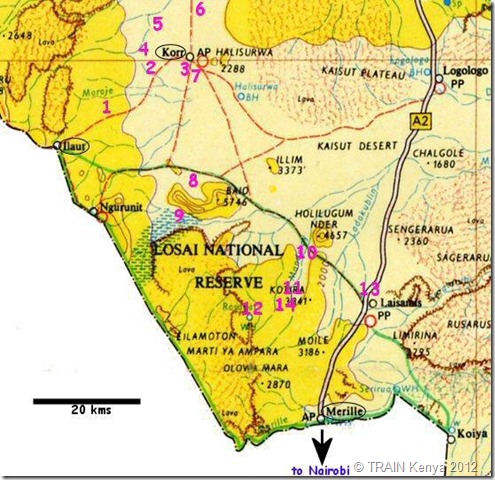
Thursday 10th. March
We left for Nairobi at 8.30 am and arrived back home at 6.00 pm much thankful to the Lord for all His grace towards us.
Please pray for:
-
The leaders – Patrick Ochieng and Raphael Bulkash
-
True conversions demonstrated by sincere repentance
-
More labourers for the harvest field
-
Wisdom to deal with physical needs so as not to prejudice spiritual needs
In Christ’s service,
Keith Underhill










